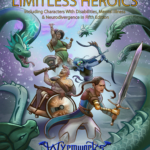Memory Loss

You have trouble remembering events. Choose or roll on the following table.
| d10 | Symptom |
|---|---|
| 1–2 | Anterograde Amnesia |
| 3–6 | Retrograde Amnesia |
| 7 | Dissociative Fugue |
| 8–0 | Traumatic Amnesia |
- Anterograde Amnesia. You are unable to form new memories but recall your past until 1d100 × 30 days ago or after a specific story arc. Recalling new events, people, directions, or other details requires a successful DC 8 + (IE) × 2 check to remember general information or a higher DC for specific details. You can still sometimes learn procedures and routines. All Experience Points you earn are divided by (IE) + 1 or, if not using XP level advancement, when gaining or increasing a feat or proficiency, you need an additional (IE)d20 days to gain the bonus. It also takes you (IE) × 5 times as long to prepare spells. This form of memory loss has no Frequency. When charmed, you get an extra saving throw each round as you may forget your favorable impression of the source of the charm.
- Retrograde Amnesia. You have difficulty recalling memories before 1d100 × 30 days ago or before a specific story arc but have full memory of everything after that. You retain general knowledge and skills but may not remember how you learned. You’re more likely to remember episodes from your distant past than more recent memories. Recalling people or events from the most recent (IE) × 20 percent of your life requires a successful DC 10 + (IE) × 2 Intelligence check, and recalling earlier memories requires a successful DC 10 + (IE) Intelligence check. A successful check will recall general information, more details requiring a higher DC. This form of memory loss has no Frequency.
Sometimes life feels like a constant brain fog. But times spent sitting with friends telling stories are the golden moments of clarity I live for.
-Niles M
- Dissociative Fugue. You are confused about your identity or have formed a new one. You retain skills from your original identity but may try using skills you don’t have. For example, you may experience frustration as to why you can’t cast spells or why you can, believe your stealth skills are better than they are, etc. The GM and player should work together on the false identity, creating a random persona but retaining most or all previous abilities. (Try a random NPC or character class generator such as the one on dndbeyond.com or npcgenerator.com to get started.) This form of memory loss does have a Frequency, and recalling a single memory about your identity requires a successful DC 10 + (IE) × 2 Intelligence check while in a fugue state.
- Traumatic Amnesia. You have little or no memory of (IE) traumatic events from your past. Recalling a detail from one of those events requires a successful DC 15 + (IE) Intelligence check. Failure requires (IE) × 30 days or until after the next adventure or story arc for each event before making another attempt. When successfully recalling a traumatic memory, you may feel overcome while you come to terms with this recovered memory and must succeed on a DC 8 + (IE) Wisdom saving throw or take one level of exhaustion for 10 × (IE) minutes. This form of memory loss has no Frequency.
Real-world Examples
Korsakoff’s Syndrome, Dementia, Post-Traumatic Stress Disorder, Dissociative Amnesia, Encephalitis
Assistive Options
Written notes or journals can help keep track of memories. Friends and allies can help with recall, granting advantage on recall attempts even if the helper was not present for the episode in question.
Magical Assistance
Divination spells like Divination and Commune can help answer questions about the past that have been forgotten, but it does not recover the actual memory.


